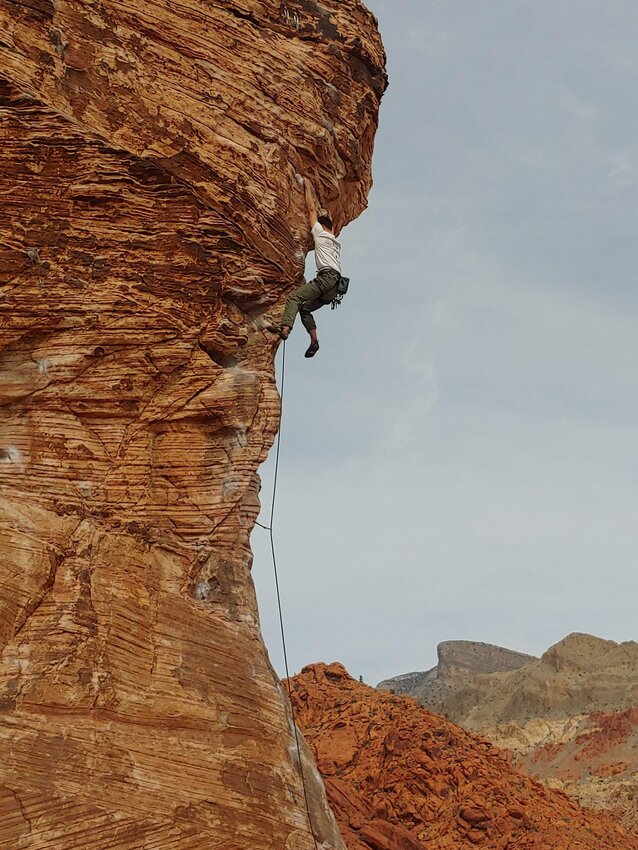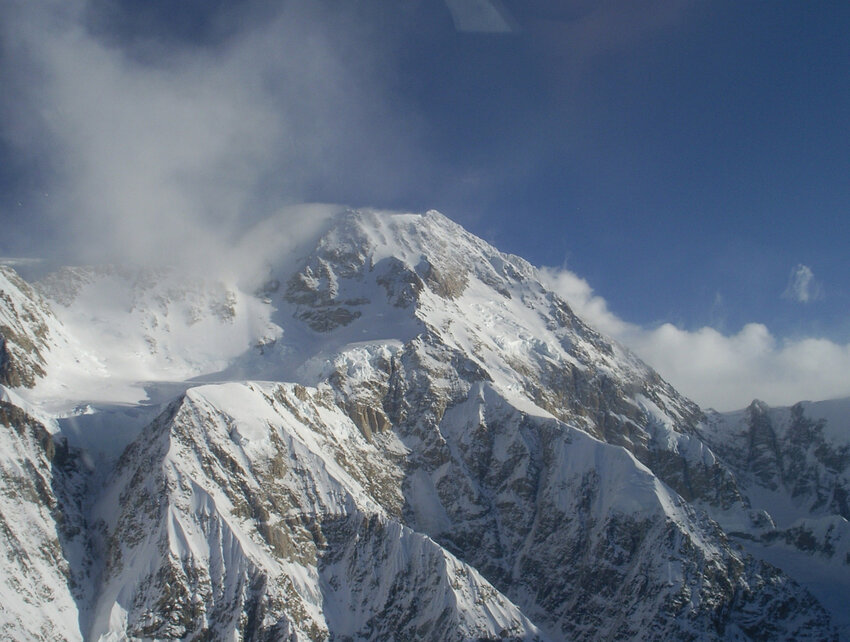 Caustic, a route in Red Rock Canyon, Las Vegas, previously called “Caustic Cock.”[/caption]
Caustic, a route in Red Rock Canyon, Las Vegas, previously called “Caustic Cock.”[/caption]As a climbing guidebook author, I’ve had to make some hard choices. Which grade should I choose to represent a route? The historic grade or the consensus grade? Which opinion matters more? The opinion of a first ascensionist that did a route 20 or 30 years ago, or the opinion of the local climbing community? And perhaps the most difficult decision of all: Should I honor a route’s historic name?
What if that route’s historic name is foul? What if the name is sexist or racist, homophobic or transphobic…? Do I have a right to revise that route’s name?
After writing four guidebooks, I’ve made the decision that I do have the right to subvert these original names. And I’ve decided that I’m okay with the backlash I’ll receive when I make this kind of decision.
There is a movement to recognize that the names of certain routes, trails and mountains are offensive. In some cases the name is offensive to a marginalized group, and in others it erases the native history of an outdoor space.
The first person to complete a rock climb has the honor of naming it. Modern rock climbing started as a countercultural movement primarily made up of white men in the 1960s and ’70s. This resulted in some deeply problematic names that a modern and more diverse climbing community finds abhorrent. Racist, sexist and homophobic names were deeply ingrained in the culture. Some may not see a problem with names like “Squaws in Heat” or “Slave Driver” or “Clean Shaven Girls,” or a myriad of other names. But for others, this made the sport exclusive, misogynistic and racist.
In recent months, there has been a movement pioneered by MountainProject.com, a website where new routes are reported, to flag offensive names. The names are reviewed and then – if found to be offensive – changed or modified. Obviously, this has come with a lot of debate and pushback. Facebook groups and internet forums are swamped with debate about this practice of “erasing history.”
Rock climbing is not the only place where insensitive names are found, though. Ski runs, ski lifts, mountain bike runs, rapids and even trails have been identified as having names that are problematic.
In Moab, Utah, a popular canyon was originally dubbed “N*gger Bill Canyon,” for a mixed race cowboy by the name of William Grandstaff who ran cattle in the area in the 1800s. It was renamed in the 1960s to “Negro Bill Canyon,” and then in 2017, to Grandstaff Canyon. Each new name was an attempt to atone for the racially charged nature of the previous name.
In 1896, a Chinese cook who worked for the Canadian Pacific Railway was bet 50 dollars that he couldn’t climb a peak just out of Canmore in 10 hours. Ha Ling won that bet when he placed a flag atop the mountain. Chinaman’s Peak was born that day, but thankfully – after much consternation and debate – it was renamed Ha Ling Peak in 1997.
Squaw Valley Ski Resort near Lake Tahoe, home to the 1960 Olympic Games, acknowledged that the name of the resort was hurtful and offensive in 2020. The resort’s ownership officially changed its name to Palisades Tahoe in the summer of 2021.
Each of these name changes was mired in controversy, but none of them hold a candle to the controversy around the name of the tallest mountain in North America. The original Native American name for this mountain was Denali. In 1896, however, a gold prospector who loved then President William McKinley, started calling the mountain Mt. McKinley to spite his friends who preferred McKinley’s political rivals. He certainly didn’t care how this renaming of the mountain affected the Native communities around it.
In 1916, when the mountain became the centerpiece of a new national park, locals argued that the name Denali should come back. But alas, it wasn’t meant to be. Those who thought the mountain’s name should hold the name of a president, even though said president never visited the mountain, were overruled. They argued that the name “Denali” didn’t mean anything, that it wasn’t descriptive enough, that it didn’t have value, even though it had been known by the name for hundreds of years.
In 1975, the state of Alaska petitioned the U.S. Board on Geographic Names (USBGN) to change the name. But as President McKinley was from Ohio, the Ohio congressional delegation wasn’t about to allow that. In 1980, the name of the park was officially changed to Denali National Park, but the mountain remained McKinley, once again due to pressure from the Ohio delegation.
It wasn’t until 2015 that the mountain officially became Denali once more. The Secretary of the Interior under President Obama, Sally Jewel, used an archaic law that empowers the Secretary of the Interior to act when the USBGN doesn’t act within a “reasonable time.” The original 1975 request from the State of Alaska was still on the books, so the board had certainly not acted within a “reasonable time.”
 Denali, formerly known as Mt. McKinley.
Denali, formerly known as Mt. McKinley.Many on the nation’s political right saw the mountain’s renaming as an overreach by the Obama administration. So today, even though the name has officially changed, it has not been universally accepted. In our partisan political environment, the use of the mountain’s name is thought to be a code for a political alliance with President Obama. Trolls arguing that the name of the mountain is still McKinley inundate message boards that promote scenic flights or climbs of the mountain. And too often the trolling is tainted with racism.
As the Denali controversy spanned several generations, it provides a window into how a name can become entrenched, and how any attempt to change the name is held up as a politically motivated erasure of history.
The city of Tacoma and the Puyallup Tribe of Indians have both made attempts to restore Mt. Rainier’s native name to Tahoma or Tacoma. It seems unlikely that this will happen in the near – or far – future. But that doesn’t mean that we can’t refer to the mountain by its indigenous name, or at least recognize that the mountain has many names. Similarly, we can honor the native roots of Mt. Baker’s native name by referring to it as Kulshan or Komo Kulshan.
Within the outdoor industry, there is a movement to bring more people into the fold, to give more people access to the sports that we love. The core idea is that if we bring more people into our community, there will be more people out there that will help to protect the fragile places where we recreate.
There are countless other rock climbs, ski runs, mountains and trails that continue to harbor controversial names. Some of these are offensive to marginalized populations and others erase the native history of an area. If we believe that outdoor recreation is valuable, and if we believe that more people with diverse backgrounds should have access to the outdoors, then we have to recognize that names of the places where we play are important and that they have an impact on people. x
Jason D. Martin is the executive director at the American Alpine Institute, a mountain guide and a widely published outdoor writer. He lives in Bellingham with his wife and two kids.